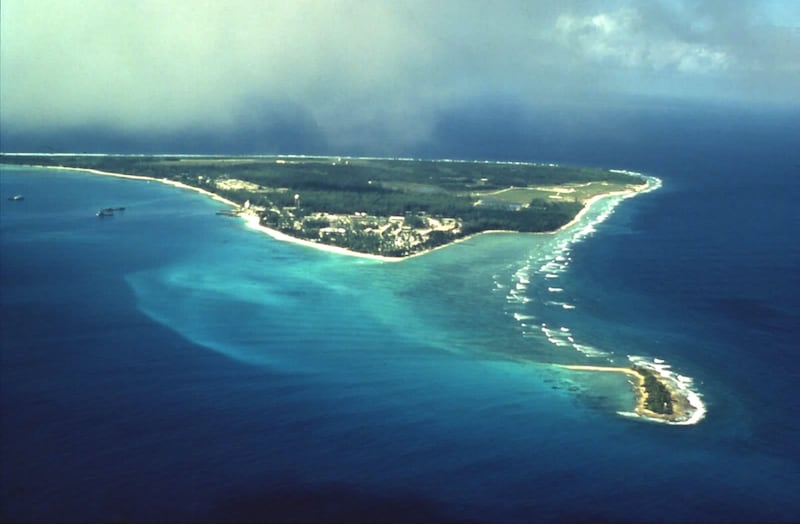Live updates: Follow the latest news on Israel-Gaza
Mauritius told the top UN court this week that Israel's occupation of Palestinian territories is illegal and presents similarities to a dispute between Mauritius and the UK over the Chagos Islands.
Mauritius put forward its argument during hearings at the International Court of Justice in The Hague over the legality of Israel's occupation of Palestinian territories since 1967, including East Jerusalem.
The hearings are unrelated to the continuing war in Gaza. Many countries have claimed, however, that it stems from Israel's illegal occupation of Palestinian territories, including Gaza, and have urged the court to call for an Israeli withdrawal. The advisory opinion is not binding.
But why do the Chagos Islands, in the Indian Ocean, more than 5,700km away from Gaza, matter in the Israeli occupation case?
A colonial framework
In establishing a parallel with the Palestinian people, Mauritius set to place discussions about Israeli occupation in a colonial framework. This was the predominant view among the dozens of countries that gave their oral statements starting on Monday. They will continue until February 26. The court is then expected to issue its opinion within six months.
In their oral statements this week, many countries, including Mauritius, referred to an advisory opinion issued by the ICJ in February 2019 on the legal consequences of the UK's 1965 separation of the Chagos Islands from Mauritius.
The court concluded that the decolonisation process of Mauritius had not been lawfully completed due to the Chagos Islands' unlawful detachment and incorporation into a new colony. The court ordered that the UK bring an end to its administration of the Chagos Islands as rapidly as possible.
Some countries argued that should the ICJ deem Israel's occupation unlawful, it would be under similar obligations. That may include withdrawing its forces and settlers from occupied territories.
Israeli officials have disputed characterisations of their country's behaviour as a colonial power. They have also rejected claims that Palestinian territories are formally occupied on the basis that they were captured from Jordan and Egypt during the 1967 war rather than from a sovereign Palestine. Both Palestinians and Israelis claim historical and religious ties to the land.
Israel declined to give an oral statement in the continuing hearings, but some of its allies, including the US and the UK, argued that the court should refrain from requesting its withdrawal from occupied territories.
They said that the existing framework for solving the conflict was rooted in UN Security Council resolution 242 issued in the wake of the 1967 war. This framework involves the withdrawal of Israeli forces in parallel to security assurances for Israel.
The US and the UK told the ICJ that an order of withdrawal without security assurances would worsen peace negotiations between Israel and Palestinians, which have been at standstill for years.

A 'significant' impact
According to Mauritius and a number of other countries including China and Ireland, this argument is flawed. The ICJ's advisory opinion on the Chagos Islands made a “significant, immediate, and irreversible impact” on its negotiations with the UK, Jagdish Dharamchand Koonjul, the permanent representative of Mauritius to the UN, told the ICJ on Thursday.
Less than three months later, the UN General Assembly adopted a resolution demanding compliance with the court's order. In 2021, a special chamber of the International Tribunal for the Law of the Sea affirmed that the ICJ's advisory opinion carried no less weight and authority than those in judgements.
In effect, long-stalled negotiations between the UK and the Maldives picked up after the ICJ's advisory opinion.
In the case of Israel's occupation, Mauritius is “confident” that the ICJ's advisory opinions “can likewise make a significant, immediate, and irreversible impact with respect to the right of Palestinian people to self-determination”, said Mr Koonjul.
“To those who suggest that the issuance of an advisory opinion might somehow prejudice the prospects of a negotiation, Mauritius underscores that, to the contrary, the court's clarification of the legal rights and obligations of the parties facilitates rather than obstructs a good faith negotiation,” said Mr Koonjul.
An 'illegal' occupation
Another argument put forward by the US and refuted by Mauritius is the fact that the ICJ cannot issue an advisory opinion on Israel's occupation because international law does not provide for an occupation itself to be rendered unlawful.
“The fact of an occupation is the basis for the occupying power to exercise its authority over an occupied territory,” Richard Visek, acting legal adviser for the US Department of State, told the ICJ on Wednesday.
Speaking on behalf of Mauritius, Pierre Klein, professor in international law at the Universite Libre de Bruxelles in Belgium, said that “many have found this argument surprising”.
“Rights and duties of the occupier vis-à-vis the occupied territories are defined by the rules of international humanitarian law,” said Mr Klein.
“But does this ipso facto justify the very presence of the occupier on the territory in question – presence with regard to which international law should be in some way neutral?
“Even if an occupying army maintained a behaviour that respects the law of occupation, its presence on occupied territories in itself is illegal if it is the result of a use of force contrary to international law or an act of annexation,” said Mr Klein.
The UK did not directly refer to the Chagos Islands case in its statement but seemed to imply that it was irrelevant.
“Over the course of this week, we have heard certain characterisations of Israel’s actions that we don’t accept. We also heard characterisations for our own conduct and the motivation for it that we emphatically reject,” Sally Langrish, legal adviser at the UK Foreign Office, told the court on Friday.
“We are confident the court will find analogies with unrelated cases to be entirely unhelpful. What matters is the case before it today,” said Ms Langrish.







